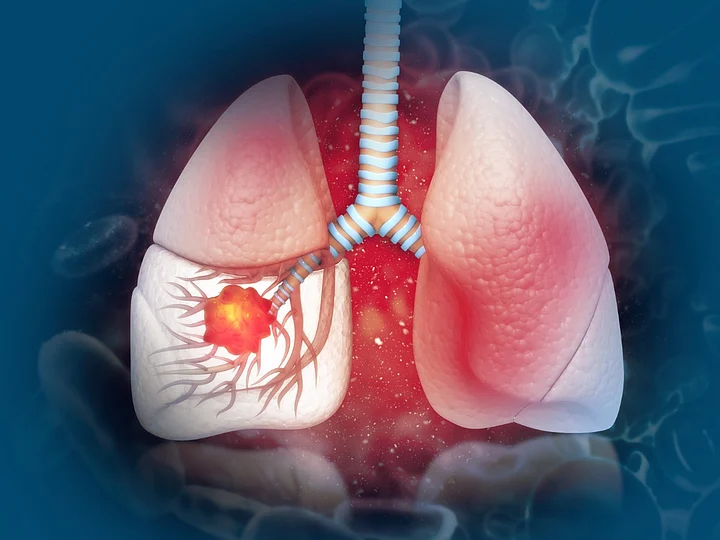Lung cancer is a type of cancer arising from the lungs due to uncontrolled cell growth in the lung tissues. They are the primary organs of the respiratory system in humans.
Lung cancer is one of the most painful cancer and difficult to treat since it tends to spread very early after its development. While lung cancer can spread to any organs of the body, the most common sites for lung cancer metastasis are:
Brain
Adrenal Glands
Bones
Cancer can also spread from other parts of the body to the lungs or be formed in the lung itself. Lung cancer occurred in 1.8 million people and resulted in 1.6 million deaths in the year 2012.
According to Centers of Disease Control and Prevention, there is a 30% chance of lung cancer in people who smoke regularly, making smoking the main cause of lung cancer.
Let us know about the other causes, symptoms, types, stages, diagnosis, and treatment of lung cancer.
Lung Cancer: Types
According to the American Cancer Society, there are two general types of lung cancer:
Non-small-cell-lung-carcinoma (NSCLC): This is the most common type and accounts for about 85% of the lung cancer cases. NSCLC is a group of all lung cancers that behave in the same way. The most common types are
Squamous cell carcinoma that begins in the cells that lines the passages of the respiratory tract.
Adenocarcinoma that forms the outer parts of the lungs
Large cell carcinoma.
Small cell lung cancer (SCLC) accounts for 15% of all lung cancers. This type of cancer forms and spreads faster than the NSCLC and can be treated only with chemotherapy and radiation therapy and for most people this type of cancer tends to return.
Lung Cancer: Causes
It is not true that only smokers can get lung cancer but 9 out of 10 patients of lung cancer are smokers. According to Centers of Disease Control and Prevention, smoking is the major cause of lung cancer and second hand smoking causes around 7,300 lung cancer in the US.
It may be because there are around 700 chemicals in tobacco out of which at least 70 are for sure the cancer-causing toxic chemicals.
The combination of tobacco and smoke tends to damage the lung cells and the continuous smoking leads to the mutation and spread of cancer cells.
Exposure to radon gas can also cause lung cancer. Inhaling other toxic substances such as asbestos, uranium, arsenic, few petroleum products, and nickel over a long period of time. Inherited factors may also be the causing agents:
Family history of lung cancer
Personal history of lung cancer
Previous radiation therapy
Lung Cancer: Symptoms
According to the doctors of Mayo Clinic, lung cancer is the leading cause of cancer deaths, it may be because it is undetectable and shows no signs and symptoms till it reaches an advanced stage. Here are the few common signs and symptoms of lung cancer:
Chest pain
Hoarseness
Bone pain
Unintended weight loss
Cough that doesn't go away
Coughing up blood
Weakness and Fatigue
Headache
Lung Cancer: Diagnosis
Your doctor may run a number of tests if he finds any reason that may be a cause of lung cancer. He may examine you physically, ask a few questions about your and your family's medical history.
Imaging tests such as X-rays or CT scans can help detect the abnormal mass in the lungs.
Sputum cytology helps detect the presence of cancer cells in phlegm for people who produce phlegm when they cough.
Biopsy is another common tests for cancer wherein they test a small tissue from the part in the laboratory.
These tests also help the doctor know the stage of cancer depending on how far the cancer has spread and it helps him make a decision for the best suited treatment options.
Lung Cancer: Stages
Tests like X-ray, CT scan and bone scan helps detect the stage of lung cancer.
In stage I, cancer is confined to the lungs.
In stage II, cancer is confined to the lungs and the nearby lymph nodes.
In stage III, cancer is present in the lungs and has spread to the lymp nodes of the chest.
In stage IV, cancer has spread to both lungs, area around the lungs and to the distant organs such as the liver.
Lung Cancer: Treatment
The stage of cancer, your general health, preferences of the doctors would decide the treatment options for you. Treatment options may include (Cleveland Clinic):
Surgery to remove a small section of the lungs as in wedge resection, or to remove a larger portion of the lungs called segmental resection, removal of entire lobe known as lobectomy and removal of an entire lung known as pneumonectomy.
Radiation therapy in which a powerful energy beam is used like the X-rays to kill the cancer cells.
Chemotherapy which involves usage of medications injected intravenously or taken orally to kill the cancer cells.
Immunotherapy is an option for people with advanced lung cancer in which the cancer cells form a protein which helps them hide from the immune cells and this therapy stops this process.
Target Drug Therapy is used to treat the advanced recurrent cancer and it manages the abnormalities of the cancer cells which results in death of those cancer cells.

